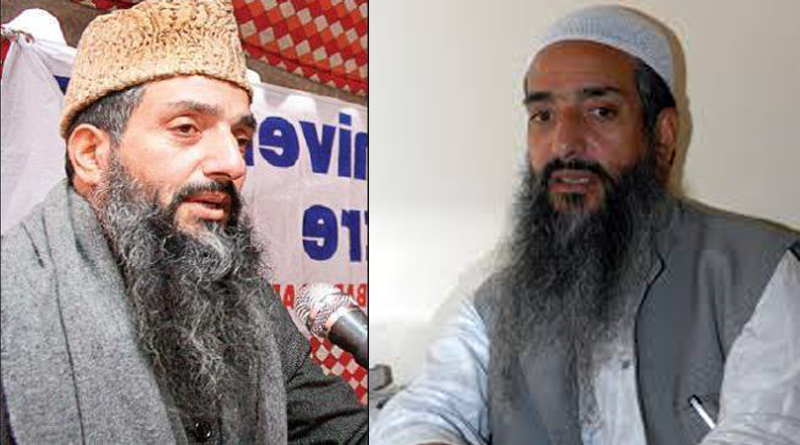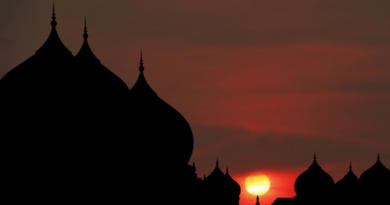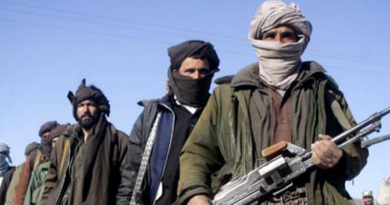Maulana Showkat Ahmed Shah Owes an Apology to all the Muslims
By:
Dr. Syed M. Inayatullah Andrabi
Convenor- Mahazi-Islami
With a valuable input from
Dr. Mohammad Al-Massa’ari
[email protected]
I have read with great shock the Friday Khutbah, Maulana Sowkat Ahmed Shah, President of Jamiat-e-Ahlihadess delivered at Gowkadal mosque Srinagar on 27/03/09. The Maulana quoted a hadith (saying) of the most beloved Prophet Mohammad(SAAW) to emphasize his point that stone pelting is prohibited in Islam, and hence the Muslim protesters in Kashmir should not throw stones on Indian armed forces which effectively includes the Indian Army, CRPF, BSF and the puppet Kashmir police. In this brief write up I intend to raise some points of fundamental nature with wider significance, obviously with reference to the cited hadith, but not focussing on the hadith as such. This is what our long standing friend, Professor(Dr) Massa’ari, a prominent Saudi dissident now living in exile in London will do after I finish my own part.
My first point is that the hadith has been taken so much out of the context that an unbiased person without any love or hate for the Maulana, will doubt if the latter himself believes that the hadith can be rightly applied to this situation. The difference of the contexts is so visible and clear that it is difficult to believe that Maulana very genuinely thinks that this hadith can be applied to the situation he has applied to. Without going into details, let us note that what the most beloved Prophet(SAAW) had said in the hadith cited by Maulana was basically regarding the ineffectiveness of a small stone to deliver the desired result when it came to hunting or taking on an enemy. The small stone would not produce the desired result, it will only harm the person or the animal. Now, if the Maulana was advocating that the Kashmiri youth use something more effective against the Indian force, and not just pebbles because they are ineffective, the hadith might sound appropriate, but, as a matter of fact, he was advocating the opposite: peaceful demonstrations. So, how inappropriate is the use of this hadith here. Does Maulana not understand that? Without casting any aspersions on his integrity, I am inclined to believe that Maulana does understand, and very well. It seems a very clear case of having a purpose first, and then bringing in the hadith to push it through. I do not say Maulana had an evil purpose, let us assume he has all good intentions in holding the view that the Kashmiri youth should not hurl stones on Indian forces, and to that extent he is absolutely genuine, but where his genuineness is called into question is in his action of applying an unrelated hadith to reinforce his point. His basic concern, it would seem, is not to uphold the norms of Halal and Haram in Islam, in which case his concerns would have been more profound, but to reinforce a particular view that has significant political implications in Kashmir.
My second point is more important and goes beyond the particular case of Maulana Showkat Ahmed that we are discussing now. It relates to our general understanding of the ‘deen’, that is Islam. To put it briefly, Islam is basically a Divine Guidance. It is Allah(SWT) who created human beings(and everything else) and also guided them. The Divine Guidance does not replace the capabilities created and bestowed by Allah(SWT) on human beings, it supplements them. As such, the Muslim mind, while being in a state of perpetual submission to its Creator and the Divine Guidance, will freely strive to utilize its creative potential, and Muslim societies will continue to flourish using their God-given capabilities of head and heart. The cardinal principle that applies here is that everything is good and permissible, unless made unlawful by Allah and/or His Messenger(SAAW). It is only the Divine authority(Messenger is Divinely inspired),i.e. God and His prophet who can rule what is Halal and what is Haram. Since change is endemic in nature, the human condition keeps changing, new things and realities keep coming up, so every new thing, not listed in the Halal things by the Beloved Prophet(SAAW)simply because it did not exist then, is entirely permissible unless proven harmful or evil by human mind, and/or found in violation with the Islamic principles. So, when Maulana Showkat Ahmed is asking for an “argument in the light of holy Quran and Sunnah to prove stone pelting as a lawful act in Islam” the answer to that is, since it is not forbidden, so it is lawful. The Maulana will then come up with the hadith saying it is forbidden, the answer to that is, that stone pelting as such may be, but the act of Kashmiri youth hurling stones at Indian forces in 2009 is certainly not forbidden, simply because such practices did not exist during the time of the beloved Prophet(SAAW). Maulana is terribly confused here: imagine someone calling the medical science of Surgery the Knife Science on the basis that knives are used there, and then making the use of knives the main issue in the whole subject. Can there be a more cruel joke than that? Similarly, the practice of stone pelting by Kashmiri Muslims on Indian forces, an age old practice, is not about stones, pebbles or bricks. It is a part of the political culture of the modern era. This practice is not about stones and pebbles, but it is about freedom, resistance and defence. India’s presence in Kashmir has been abhorred since 1947, and people have given vent to their anger in so many ways. There are still doing that, sometimes picking up a stone at other times a gun, in short any and everything that they can get their hands on. Of course, it is up to the sensible and mature sections of the society to constantly evaluate the effectiveness of various methods employed, and come up with a cost-benefit analysis of the actions that are undertaken. The effectiveness or otherwise of people resorting to stone pelting, also can be critically looked at, and different people can have different opinion on this subject, so can have Maulana Showkat. All such things are decided on the basis of strategic efficacy. Maulana too can argue against stone pelting on the basis of concrete data, but when he invokes Divine teachings to do that he is doing something very serious: he is effectively making a claim that the stone pelting in recent times by Kashmiri youth on Indian forces is disapproved by the beloved Prophet(SAAW). If that be truly the case, can any Muslim with a trace of ‘iman’ (faith) raise any further questions, and not obey what the Prophet(SAAW) has said. “and whatever the Messenger gives you, accept it, and from whatever he forbids you, keep back, and be careful of (your duty to) Allah; surely Allah is severe in retributing (evil):” that is what Allah(SWT) says in Quran(59:07)? So if the beloved Prophet, even with a slightest gesture let alone explicit instruction, prohibits the Muslims of Kashmir from throwing stones on Indian forces, who on this earth will raise an eyebrow, and why. So, the question is not what Maulana is asking “how can we then ignore the commandments of our holy Prophet Muhammad (SAW).” It is not the question of obeying or ignoring(God forbid) the commandment of our holy Prophet Muhammad (SAW), the question is, does such a commandment exist? Now, we, that means the Muslims Maulana is addressing whether in Gowkadal or in London, believe that stone pelting is a part of resistance against Indian forces, and whether or not it should be continued depends on the cost-benefit analysis of this method. We do not claim any Divine sanction to legitimize the action of stone pelting, we do not say this particular action of stone pelting in Kashmir has been ordained by the beloved Prophet. On the other hand, Maulana Showkat claims that the beloved Prophet disapproves the ongoing action of stone pelting by Kashmiri youth on Indian forces. By doing so, he is very clearly ascribing to the noble Prophet something which he, the Maulana, cannot substantiate that the beloved Prophet(SAAW) really did. Actually the opposite is true: evidence leads us to believe that what the beloved Prophet(SAAW) said about stone pelting does not amount to disapproving the current practice of stone pelting. Maulana should be knowing how grave an offence it is to ascribe something to Allah(SWT) or His Messenger(SAAW) about which one has no knowledge. But that is Allah’s domain, as to the community of believers, Maulana Showkat Ahmad Shah owes an apology to all Muslims for ascribing to the beloved Prophet something which the Prophet did not do.
End of Part-1
Part-2
By: Dr. Mohammad Al-Massa’ari
The original quote: [the book of Al-Adab (Good manners) in Sehi Bukhari Sherief. Abdullah bin Mughaffal Al-Muzani narrated: the Prophet (SAW) forbade the throwing of stones (with the thumb and the index or middle finger), and said: “It neither hunts a game nor kills (or hurts) an enemy, but it gouges out an eye or breaks a tooth.”]
My comment:
FIRSTLY: The phrase “throwing of stones (with the thumb and the index or middle finger)” is not a very lucky translation of the Arabic word “Khathf” (الْخَذْفِ), which means throwing small-sized stones (throwable with the thumb and the index and/or middle finger) like those used for “stoning” the Devil in Hajj. The recommended size of “Khathf” (الْخَذْفِ) in Hajj is the size of a chickpea, or about, as it is a purely symbolic act, which should, in addition, not harm by-standers. There is also a verb: Khathafa meaning: throwing with chickpeas sized stones.
The Hadeeth relates to hunting game. The objective is to kill the game speedily with minimum pain, which is normally not achieved by “Khathf” (الْخَذْفِ).
So Moulana Showkat Ahmad Shah must first establish:
(1)- Either the Indian Soldiers are not a belligerent enemy, which can be killed, harmed or other wise injured … then all use of armed force is prohibited;
(2)- Or they are indeed a belligerent enemy, and then killing, harming, injuring and annoying them, by all means, is permissible, with what ever available force. If he insists on excessive “Adaab”, then he should have recommend large deadly stones instead to be thrown with the full fist (or even better: bullets!!).
SECONDLY: There is also another Hadeeth in both Saheehs (Bukhari and Muslim): narrated Abu Hurairah that he heard the Messenger of Allah (SAW) saying: [If some one looks in your house, without your permission, and you do “Khathf” (Khathaftahu) with a stone plucking or gouging out his eye, there would not be any blame (or liability) on you].
Thus Moulana Showkat Ahmad Shah should know, from his Usul-ul-Fiqh education, that this means that the prohibition of “Khathf” (الْخَذْفِ) is not absolute or general: there are restrictions and specialisation. He should have pondered about the actions of the Indian Soldiers: Are these actions, which include violating Muslim’s privacy and invading their private homes, not just looking-in the without permission, not giving permission to the oppressed, violated and abused to use “Khathf” (الْخَذْفِ) against them?!
***
Dr. Syed M Inayatullah Andrabi is a well-known figure in the circles of political Islam. Born in Srinagar, the capital city of Indian Held Kashmir, Dr Andrabi has been intimately involved at the intellectual level with the global politics and political issues since his student days in 1980 at Pune (India), where he completed his Ph.D. in Linguistics in 1983 at the Centre of Advanced Study in Linguistics, Deccan College, University of Pune, Pune, India. Upon completing his doctorate he returned home to join the University of Kashmir, first on a post-doctoral fellowship and later as faculty, but could not continue because of the deteriorating security situation in Kashmir, and had to move to United Kingdom in 1994 where he continues to live since along with his wife and five children.




